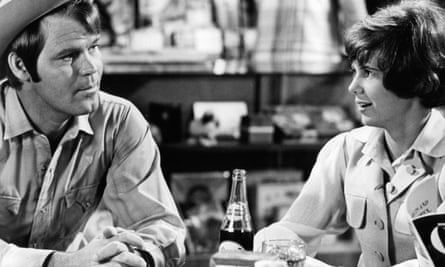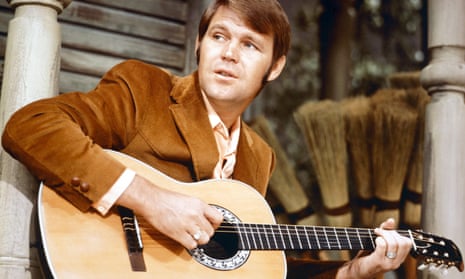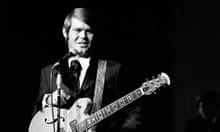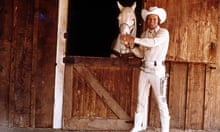The singer and guitarist Glen Campbell, who has died aged 81, made his greatest artistic contribution as the principal interpreter of songs by Jimmy Webb, notably Wichita Lineman, By the Time I Get to Phoenix and Galveston, all recorded in the late 1960s. The clarity of Campbell’s enunciation and the sweetness of his tenor voice brought out the poetry and emotion of the compositions; he described his style at this time as “crock” – a blend of country and rock.
His greatest success came in the following decade with the million-selling singles Rhinestone Cowboy (1975) and Southern Nights (1977). Neither was from a conventional country music source. Rhinestone Cowboy was composed by the New York pop songwriter Larry Weiss – whose rhyming of “compromisin’” with “horizon” particularly appealed to Campbell – while Southern Nights was a reworking by Campbell of a piece by the New Orleans writer and producer Allen Toussaint, who acknowledged that “Glen made it into a real song”.
Campbell’s rags-to-riches story began in Billstown, near Delight, Arkansas, where he was born the seventh son of 12 children. He often stated that he was “the seventh son of a seventh son”; his parents, Wesley Campbell and his wife, Carrie (nee Stone), were sharecroppers – tenant farmers who gave part of their crop to the landowner. At the age of four, Glen was given his first guitar, a five-dollar instrument bought from a Sears Roebuck mail order catalogue. With the aid of records by the jazz guitarists Django Reinhardt and Barney Kessel, he quickly became a skilled player.
After dropping out of school at 16, he joined the country and western band of his uncle Dick Bills, performing around Albuquerque, New Mexico. Within a few years, Campbell was leading his own band, the Western Wranglers. After moving to Los Angeles to work as a session musician, he became a member of the renowned team of instrumentalists known as the Wrecking Crew. They played on hits by Frank Sinatra, Elvis Presley, the Righteous Brothers, the Beach Boys and the Monkees.
The drummer Hal Blaine, a key member of the Wrecking Crew, said of Campbell: “He was one of those great guitarists who could hear a part once and he had it down pat. Arrangers just loved that he could play off-the-wall solos, just the wildest sounds you ever heard.” Perhaps his most famous studio contribution came on I Get Around by the Beach Boys. In the early 1960s, he played acoustic, electric or 12-string guitar on numerous Beach Boys recordings, including Help Me, Rhonda and Dance, Dance, Dance. Though Campbell’s inability to read music occasionally made him the butt of jokes in the studio, the esteem in which he was held by the Beach Boys was evident when he was asked to tour with the group in 1965.
Campbell was a temporary replacement for Brian Wilson, who had retired from live appearances after suffering a panic attack on a flight from Los Angeles to Houston in December 1964. Campbell played and sang on stage with the group for three months before giving way to Bruce Johnston. As a token of his gratitude, Wilson produced Campbell’s Guess I’m Dumb, written by Wilson, which Campbell released as a single later in 1965. He also supplemented his session income by backing a range of artists in concert, from Sinatra to Presley.
His first recording as a featured singer was Turn Around, Look At Me, for the small Crest label in 1961. It led to a contract with the EMI subsidiary Capitol Records. Campbell’s early efforts for the company, including a version of Buffy Sainte-Marie’s The Universal Soldier in 1965 and, two years later, Gentle on My Mind, a ballad by John Hartford, were not commercially successful. His first pop hit, By The Time I Get to Phoenix, composed by the then unknown Webb, came in 1967. Campbell became a close friend of Webb, and Wichita Lineman and Galveston were top 10 hits in the US and top 20 hits Britain in 1969.

Thanks to his chart success, Campbell was now in demand for television and film appearances. He had his own TV show, the Glen Campbell Goodtime Hour, between 1969 and 1972, and starred with John Wayne in the western movie True Grit (1969), based on a novel by Charles Portis. He also sang the film’s title song, written by Don Black and Elmer Bernstein. The following year, Campbell took the lead role in the film Norwood, also based on a novel by Portis.
The hit records continued throughout the 70s, as Campbell’s choice of songs and vocal stance veered towards the middle of the road approach associated with Andy Williams and Neil Diamond. A revival of Conway Twitty’s 1958 hit It’s Only Make Believe was a top 10 single in 1970 on both sides of the Atlantic.
Like many country singers, Campbell recorded duets, first with Bobbie Gentry (their version of All I Have to Do Is Dream was No 3 in the UK in 1969) and later with Anne Murray, Rita Coolidge and Tanya Tucker. Campbell began an affair with Tucker, who was half his age, and the relationship scandalised the straitlaced country music establishment until it ended in mutual recrimination in 1981.
Soon afterwards, Campbell married his fourth wife, Kim Woollen, and announced that he had given up alcohol and drugs, although a subsequent relapse in 2003 led to a brief jail sentence for drink-driving. His first three marriages – to Diane Kirk, Billie Nunley and Sarah Barg, with all of whom he had children – ended in divorce.
Campbell became a born-again Christian and with Kim joined a Messianic synagogue. His three children with Kim eventually became part of his backing group and his later performances were divided into those for secular and those for religious audiences. In the early 90s, he had a residency at the Grand Palace theatre in Branson, Missouri. He published a somewhat self-serving auto- biography, Rhinestone Cowboy, in 1994.
In 2011 Campbell was diagnosed with Alzheimer’s disease, after which the album Ghost on the Canvas was released and he made a farewell tour of North America and Europe. The tour, and Campbell’s struggle with Alzheimer’s, was documented in a film, Glen Campbell: I’ll Be Me (2014), directed by James Keach. Campbell, with his co-writer Julian Raymond, was nominated for best original song Oscar for the theme, I’m Not Gonna Miss You. In 2012 he won a Grammy lifetime achievement award, and his last album, Adiós, recorded in 2012-13, was released in June.
Campbell is survived by Kim, five sons, three daughters and 10 grandchildren.







Comments (…)
Sign in or create your Guardian account to join the discussion